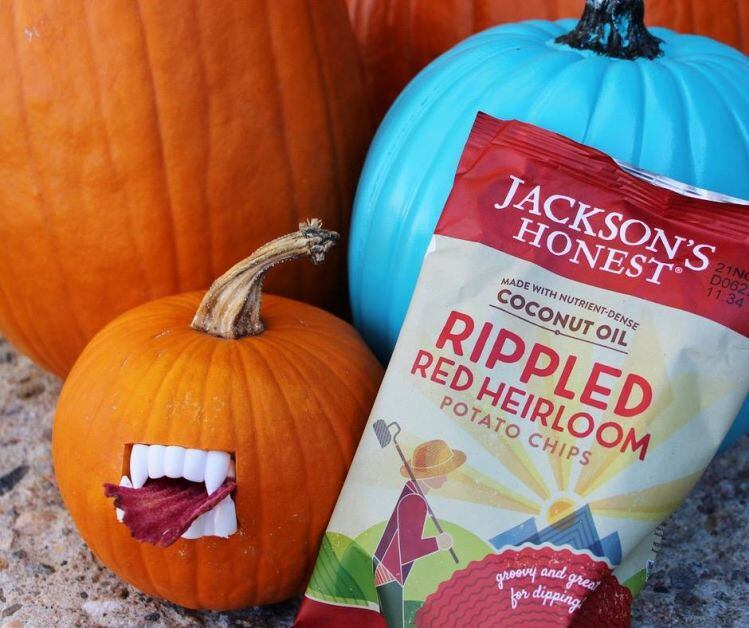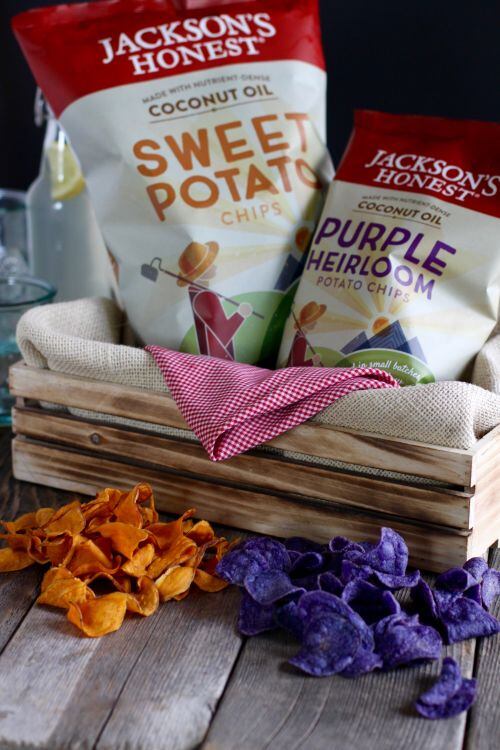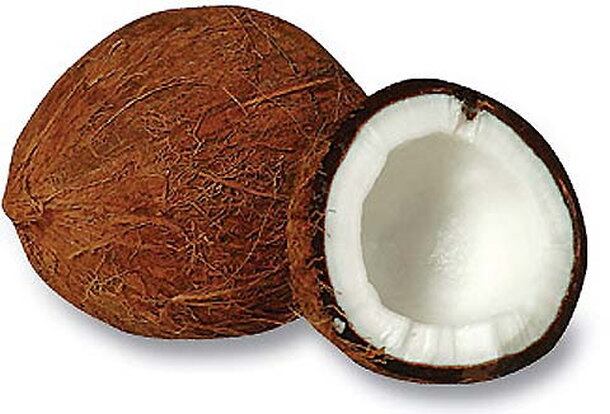Launched in 2012, Jackson’s Honest manufactures a variety of potato and tortilla chips, including sprouted red corn, purple heirlooms and sweet potato, all cooked using coconut oil.
Unusually high in saturated fats – 5-7g per 1oz serve – and rich in protein, antioxidants and vitamins, husband-and-wife founders Scott and Megan Reamer said introducing coconut oil-cooked chips provided market choice that wasn’t currently there.
Scott Reamer told FoodNavigator-USA: “If you never have an opportunity to eat a saturated fat chip, then you are making a prescriptive judgment. Our desire was to give people an option so they could have a saturated fat, cooked snack food.
“…The opportunity is so large in salty snacks and so we can meet our missions on bringing some of these ancestral fats back into the food chain. In our mind’s eye, we would love our consumers to have choices in every packaged food – more saturated, ancestral fats,” he said.
Double-digit growth to continue
Since launching, Jackson’s Honest has driven sales from $1.4m in 2014 to $10.1m in 2016. And whilst in the same year the company lost $1.7m to no-cost deals with retailers to gain shelf space, the Reamers said they had no regrets.
“We approached it with this attitude that it’s hard to get that shelf space and distribution and the opportunity doesn’t always present itself again, so we wanted to make hay with it when it presented itself,” Megan Reamer said.
“…It was a calculated risk that we took but from where we’re sitting, it has paid off and we’re looking forward to the future,” she added.
Scott Reamer said a recent business partnership and $1.25m investment from millionaire marketer Rohan Oza – secured during an appearance on ABC’s television show ‘Shark Tank’ – would play a huge part in future success.
Oza’s knowledge and expertize in consumer packaged goods, he said, would prove invaluable in the remarkably competitive salty snacks arena.
“He has resources and contacts throughout industry – operational; packaging and design; marketing and branding; as well as product insights and R&D – so, on every single one of those dimensions, he’s given us access to people and companies we didn’t know before.”
Growth this year, he said, would “unquestionably” be double-digit thanks to the partnership.

Sat fats for the masses?
But, are there really droves of consumers looking for saturated fat snacks?
The saturated fat debate has long ensued amongst the scientific, food, beverage and medical communities with arguments for and against reduction, replacement and complete avoidance.
But despite debate, the 2015-2020 US Dietary Guidelines outlined just last year that no more than 10% of daily calories should come from saturated fats (that’s less than 20g per day based on a 2,000kcal diet).
Each 1oz serving of Jackson’s Honest chips represented around 35% of that daily recommendation.
Asked if it was responsible to be manufacturing a product so high in saturated fats, Reamer said: “The science isn’t settled ...What we’ve found is that, when given information and choice, so many people have re-embraced these fats into their diets.
“…To preclude an entire class of fats that have been in the food chain for thousands of years from all consumers is using a hammer when a scalpel is perhaps necessary. It’s too broad to apply to every person’s unique circumstances,” he said.
Reamer said that had his family followed the recommendations on saturated fats, his son – who died earlier this year following a lengthy battle with the very rare genetic inflammatory autoimmune disease Aicardi-Goutieres Syndrome – would have led a very poor quality of life.
After years of working with specialists and medical practioners, the Reamers turned to diet adjustments in a bid to stabilize their son’s condition – something they achieved via a fat-rich, low-carb diet; cooking everything in coconut oil.

Megan Reamer said there was a “larger conversation” happening around coconut oil because of its high lauric acid content and associated anti-inflammatory properties.
“Folks are not just buying it to cook with, they’re looking for products with it in, which signals a larger trend of people analyzing food to make them feel better – whether that’s for a behavioral issue or medical condition – they’re analyzing food in a completely different way and they’re applying it on the inflammatory spectrum or markers.
“…When we launched Jackson’s Honest we felt we were definitely in this little niche market and I would say we were pleasantly surprised then about the breadth of interest, and that spectrum has only increased more widely over the last five years."
Asked what the next five years might bring, she said: “Scott and I feel determinedly passionate and we both believe we’re the stewards of Jackson’s legacy, and so we definitely have even more determination to see Jackson’s Honest through and take it as far are we’re able to do so…
"Bringing these products to market as this coconut oil brand and platform is something we feel compelled to do, for personal and professional reasons, and the opportunities we see ahead of us to do that are immense.”
IS COCONUT OIL HEALTHY?

According to USDA charts, coconut oil is higher in saturated fat than butter, lard, palm oil, and beef tallow, which the dietary guidelines advise Americans to replace with liquid oils higher in mono and polyunsaturated fats.
So is coconut oil a ‘healthy’ fat? According to a recent advisory from the American Heart Association published in the journal Circulation, coconut oil raises LDL (‘bad’) cholesterol. And while it also raises HDL (‘good’) cholesterol, likely due to its high levels of lauric acid, say the authors, this doesn’t necessarily cancel out the effect on LDL, whereas some oils high in mono- and poly-unsaturated fats not only raise HDL but also lower LDL.
“Changes in HDL cholesterol caused by diet or drug treatments can no longer be directly linked to changes in cardiovascular disease (CVD), and therefore, the LDL cholesterol–raising effect should be considered on its own… Because coconut oil increases LDL cholesterol, a cause of CVD, and has no known offsetting favorable effects, we advise against the use of coconut oil.”
A 2016 meta-analysis of eight clinical trials and 13 observational studies looking into coconut oil and cardiovascular health concluded that, "The weight of the evidence from intervention studies to date suggests that replacing coconut oil with cis unsaturated fats would alter blood lipid profiles in a manner consistent with a reduction in risk factors for cardiovascular disease."
However, it also acknowledged that, "The effect of coconut consumption on the ratio of total cholesterol to high-density lipoprotein cholesterol was often not examined [in these studies]," and that, "Observational evidence suggests that consumption of coconut flesh or squeezed coconut in the context of traditional dietary patterns does not lead to adverse cardiovascular outcomes."
